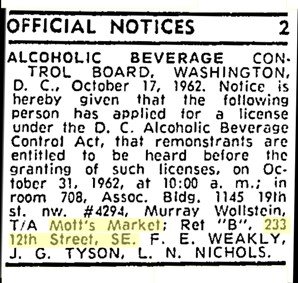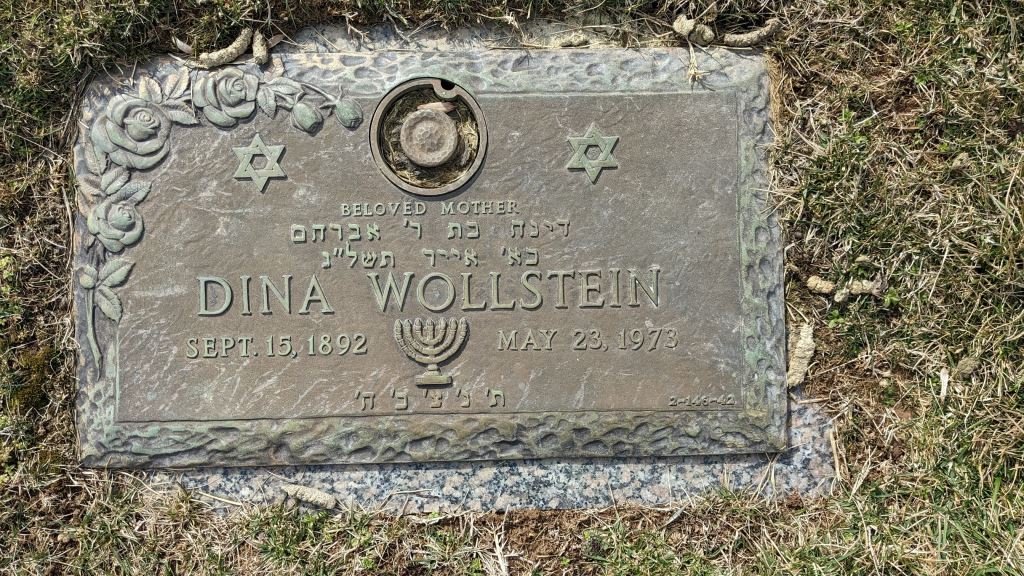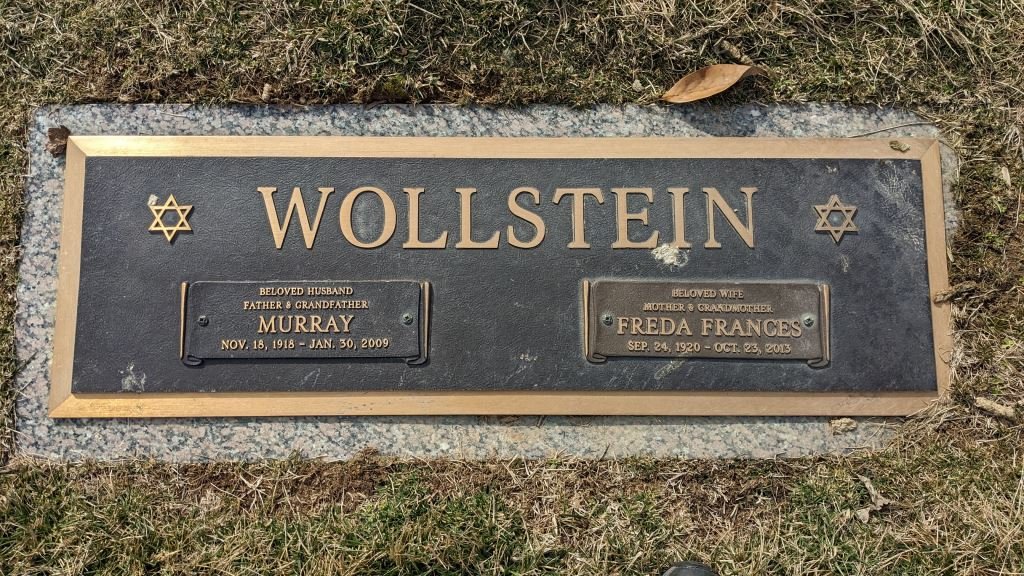Where did the “Mott’s Market” name come from? Very likely, an immigrant mother’s Yiddish nickname for her son.
History by: Bill Black
February 28, 2023
The building now known as Mott’s Market, at 233 12th Street SE, was constructed in 1916. Since then it has continuously operated as a small grocery serving local residents.
It appears that the early building owners and store proprietors did not give a name to the market. What may be the first naming occurred in 1938. In September of that year Louis Brodsky and his wife bought the building from David Minkoff. Minkoff had owned the building and operated the market since about 1923.
About a month after the Brodsky family purchased the property, Louis applied to the DC government for a permit to put a sign on the building, using the name the Good-Will Stores.
In December 1939 the Brodsky family sold the building to Fred Kogod. In 1940, according to data from the federal census that year, a new family, headed by Max Rosenberg, was renting living quarters in the building and running the store. In December 1941, Rosenberg applied to put up a new sign, with the name of the Lincoln Market.
In the 1950s, under new store proprietors, the grocery was renamed as Ruby’s Market and later as the S and A Market.
The next—and, by far, longest-lasting—renaming occurred in 1962. In October of that year, a new proprietor, Murray Wollstein, submitted a liquor license application to the D.C. Alcoholic Beverage Control Board. According to the notice published in The Washington Post and Times-Herald newspaper, the business would be called Mott’s Market.
The 12th Street SE store first used the Mott’s Market name in 1962, according to this liquor license application.
The small grocery at 233 12th Street SE has had various names over the decades.
The nearby grave marker for Murray Wollstein’s mother Dina contains both English and Hebrew text
Klein suggested that one way to further confirm the Mordecai-Mottel-Mott’s connection would be to see the grave marker for Murray Wollstein. That is because many Jewish persons in the United States include an individual’s Jewish, religious name in Hebrew script on the marker, in addition to any English text.
Nevertheless, Murray’s grave marker and that of his wife Freda are written only in English. In contrast, the nearby marker for Murray’s mother Dina includes both English and Hebrew text.
If even more evidence were needed to support the Mordecai-Mottel-Mott’s link, Klein suggested a way to find it: check the names of Murray’s ancestors back in Russia. Among Jewish families in central and eastern Europe and their descendants who have emigrated to other countries, a new child is often given the Jewish, religious name of a deceased family member, as a way of honoring that person.
If eventually done, that new research could add another interesting chapter in the long, rich history of 233 12th Street SE.
Like many of the previous operators of 233 12th Street and of other small groceries around the city, Murray Wollstein’s family was Jewish and had roots in Central Europe or Russia and other parts of Eastern Europe.
Murray’s mother, Dina, had left Russia in 1918 to join her husband, Isaac, who had arrived in New York City in 1913. Dina and Isaac’s first child, Murray, was born in November 1918. According to data from the 1920 U.S. census, both Isaac and Dina spoke Yiddish as their first language. Yiddish is a Germanic language, but it’s written using the Hebrew alphabet.
Following the end of World War I in 1918, the part of Russia that Isaac and Dina had come from was made part of the newly reconstituted country of Poland.
At some point between 1925 and the end of 1927, the Wollstein family moved from New York City to Washington, D.C. According to data compiled in December 1927 for the 1928 volume of Boyd’s Directory of the District of Columbia, they were living at 441 Delaware Avenue SW and running a grocery store there.
Members of the Wollstein family continued operating that Southwest grocery into the late 1950s. That was when massive “urban renewal” in that quadrant of the city was underway. Many smaller properties, including their grocery, were razed, to be replaced by newer, larger buildings and the Southeast/Southwest Freeway (I-395/I-695).
After leaving Southwest Washington, for several years Murray Wollstein operated a small grocery store at 1729 13th Street NW.
Unfortunately, he had to leave that building as well when it and other surrounding properties were to be torn down to make way for several larger structures, including the Garrison Elementary School. And then in 1962, as indicated in the liquor license application, Murray Wollstein took over the grocery store at 233 12th Street SE.
Murray called both the short-lived Northwest store and the Southeast one Mott’s Market.
In a December 2022 telephone interview, Frank Wollstein, Murray’s last-surviving son, explained how his father may have chosen that name. It was based on a nickname that Murray’s mother used with him inside the family, including during the times she and other family members were working together in one of the markets they operated.
To Frank, the nickname sounded something like “Mottel” or “Motto” or “Muttle.” Those forms and various others are Polish Yiddish nicknames for the Jewish, religious name Mordecai. Similarly, in “The Fiddler on the Roof” musical and movie, which is set in Russia around 1905, Motel is the nickname of the Jewish tailor who marries Tevye's daughter Tzeitel.
Information collected in December 1961 for the 1962 Polk’s Washington City (District of Columbia) Directory indicates that the first store that Murray Wollstein called Mott’s Market was in Northwest Washington.
Not being familiar with Yiddish, the Wollsteins’ market customers were confused by the nickname that Dina Wollstein used with her son. According to Frank, his father chose “Mott’s Market” as a simplified form of his Yiddish nickname, which would be easier for the store clients to pronounce and remember.
Frank Wollstein’s explanation of the “Mott’s” name makes a lot of sense, according to Levi Klein, a Jewish rabbi in Memphis, Tennessee. Klein was born in New York City and grew up in a Yiddish-speaking home. His father had immigrated to the United States from Israel, and his mother from Russia. For his parents, Yiddish was the strongest language that two of them had in common.
Interviewed by phone in January and February, 2023, Klein emphasized that the only Jewish, religious name to which the nickname Mottel would be linked is Mordecai.
The grave marker for Murray Wollstein and his wife Freda contains only English text.






